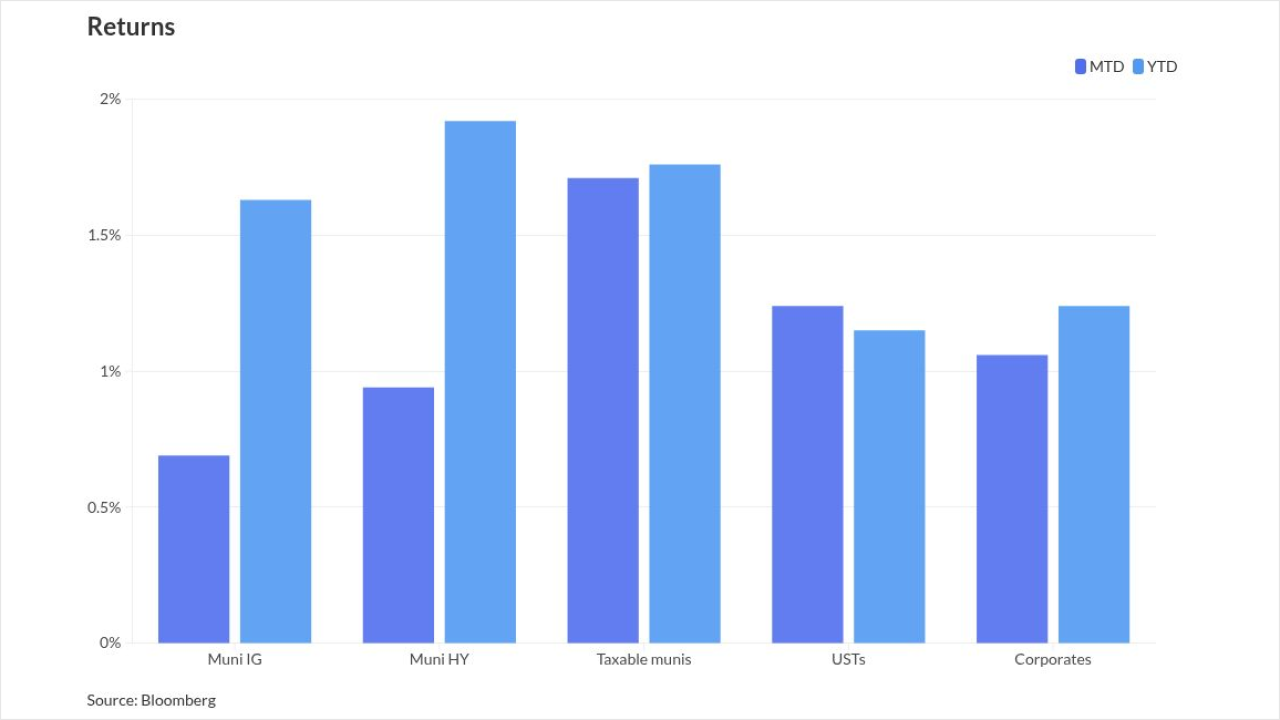Muni yields continued to follow Treasury yields lower as fears about Europe drove global markets.
Traders noted that yields have dropped so much over the past few months that participants are starting to hit a wall of resistance, with buyers and sellers wondering how much lower yields can go.
“Munis have run up a few basis points in the last few days and I would have thought they would run up more,” a New York trader said. “But they have run up so far that it’s hard to get a bid on them. Everyone wants to sell at the highs but there are no buyers. The bid side is the same.”
He added that while there’s not a whole lot of volume in the new-issue market, there are a few New York-area deals coming. “Hopefully, we’ll see those priced right and people will get more interested,” he said.
Another trader noted that munis were trading, but weren’t necessarily firmer. “Stuff is trading but not higher,” a second New York trader said. “Munis have rallied in the past six months. We are at a point where even though munis are 100% of Treasuries, people aren’t interested in such low rates.”
Still, munis finished steady to firmer Thursday, according to the Municipal Market Data scale. Yields inside six years were steady while seven- to 11-year yields fell one basis point. Yields on 12- to 21-year maturities were steady while yields outside 22 years fell one and two basis points.
On Thursday, the 10-year yield fell one basis point to 1.79% while the 30-year yield dropped two basis points to 3.08%. The two-year yield closed steady at 0.33% for the seventh consecutive trading session.
The 10-year yield remains 12 basis points above its record low of 1.67% as recorded by MMD on Jan. 18. The 30-year yield is three basis points above its record low of 3.05% set May 14.
Treasuries finished much stronger Thursday. The benchmark 10-year yield plunged five basis points to 1.57%, setting a new record low. The 30-year yield dropped six basis points to 2.65%. The two-year yield fell one basis point to 0.27%.
In the primary market, Morgan Stanley priced $168.3 million of Massachusetts Educational Financing Authority educational loan revenue bonds subject to the alternative minimum tax, rated AA by Standard & Poor’s and A by Fitch Ratings.
Yields ranged from 3.10% priced at par and 3.07% with a 5% coupon in a split 2018 maturity to 4.95% with a 5% coupon in 2030. The bonds are callable at par in 2021. Yields were lowered two to three basis points on the short end from preliminary pricing.
In the competitive market, Citi won the bid for $600 million of Virginia Transportation Board revenue bonds, rated Aa1 by Moody’s Investors Service and AA-plus by Standard & Poor’s and Fitch.
Yields ranged from 0.20% with a 3% coupon in 2013 to 3.85% with a 4% coupon in 2037. The bonds are callable at par in 2022.
Wells Fargo Securities won the bid for $113.7 million of triple-A rated Massachusetts Water Pollution Abatement Trust revenue bonds. The auction follows a $250 million pricing launched earlier this week in the negotiated market.
Yields on the first series of $76.9 million ranged from 2.20% with a 5% coupon in 2025 to 3.324% with a 3.25% coupon in 2030. Credits maturing in 2029 and 2031 were not formally re-offered. The bonds are callable at par in 2020.
Yields on the second series, $36.8 million of refunding bonds, ranged from 2.29% with a 5% coupon in 2025 to 2.74% with a 5% coupon in 2031. The bonds are callable at par in 2022.
In the secondary market Thursday, trades compiled by data provider Markit showed firming.
Yields on California 6.2s of 2019 and San Antonio Electric and Gas System 5s of 2022 each fell five basis points to 3.25% and 2.08%, respectively.
Yields on New York City Transitional Finance Authority 5s of 2025 and New York City Municipal Water Finance Authority 5.79s of 2041 each dropped four basis points to 2.55% and 3.81%.
Trades reported by the Municipal Securities Rulemaking Board showed firming even over the past week.
A dealer sold to a customer Massachusetts 4.2s of 2021 at 2.34%, 21 basis points lower than where they traded the day before.
A dealer sold to a customer New York City Industrial Development Agency 5s of 2035 at 4.04%, 13 basis points lower than where they traded a week ago.
Another dealer sold to a customer Los Angeles 5s of 2024 at 0.31%, nine basis points lower than where they traded a week before.
A dealer bought from a customer Pennsylvania 5s of 2023 at 2.18%, eight basis points lower than where they traded last week.
As the muni rally continues to lag that of the Treasury market, ratios increase as munis underperform their taxable counterparts and become comparatively cheaper.
The five-year muni-to-Treasury ratio jumped to 113.6% on Thursday from 108.7% on Wednesday. It was 100% on Tuesday. The 10-year muni yield to Treasury yield ratio jumped to 114.7% on Thursday from 111.1% on Wednesday, up from 105.8% on Tuesday.
The 30-year ratio also jumped to 116.2% on Thursday from 114% on Wednesday. The ratio had finished at 110.6% on Tuesday.





